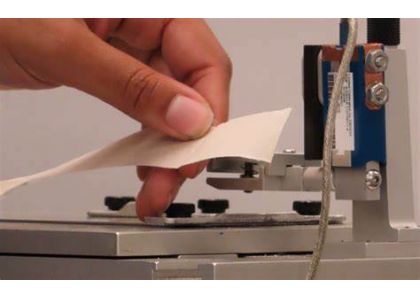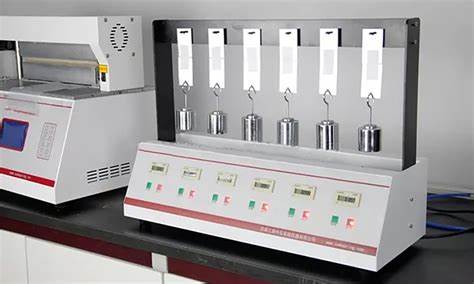
Filament sealing tape is a vital component in various industries, particularly for secure packaging and bundling. Its applications range from simple household tasks to complex industrial processes where high strength and reliability are essential. Among the different types available, reinforced fiberglass tape and industrial fiberglass tape are particularly noteworthy for their exceptional durability and performance. As businesses seek out filament sealing tape suppliers for high-quality products, understanding the testing methods for these tapes becomes crucial to ensure they meet the demanding requirements of specific applications.
Durability in sealing tape is a critical factor that dictates its usability across various applications. Filament sealing tape is designed to withstand a range of environmental conditions, including temperature variations, moisture, and physical stress. The reinforced structure of reinforced fiberglass tape enhances its resistance to tearing and shear forces, making it suitable for heavy-duty tasks. Similarly, industrial fiberglass tape offers high tensile strength, which is essential for applications involving heavy loads or extreme conditions.
To ensure that these products consistently meet necessary performance standards, various testing methods are employed, such as tensile strength testing, adhesion testing, peel strength testing, environmental resistance testing, and deformation rate testing.

Tensile strength testing measures the tape’s ability to withstand pulling forces without breaking. This method evaluates the maximum load the tape can handle while maintaining its integrity. The test is typically performed using a tensile strength tester, which applies a controlled tensile load to the tape until failure occurs.
For industrial fiberglass tape, the expected minimum tensile strength can vary based on its intended application. High-performance tapes generally exhibit tensile strengths exceeding 200 pounds per inch of width. Manufacturers often publish these specifications, which are critical for users in industries such as construction, automotive, and logistics. Strength tests also facilitate comparisons among products from different filament sealing tape suppliers, ensuring consistency and reliability in performance.
Adhesion testing assesses how well the tape sticks to various surfaces under different conditions. This involves applying a standard test tape to a substrate and then peeling it away at a controlled angle and speed. The force required to peel the tape is measured, providing insight into its adhesive capabilities.
Adhesive performance can vary significantly among products, making this test particularly important when sourcing strapping tape wholesale for industrial applications. A tape with strong adhesion will remain intact during transit and handling, reducing the risk of package failure.
Peel strength testing is a specific type of adhesion test that evaluates the force required to peel the tape away from a substrate at various angles, typically at 45°, 90°, and 180°. Each angle represents different scenarios in which the tape may be subjected to stress.
· 45° Peel Test: This angle simulates a moderate shear force, which is common in many packaging applications.
· 90° Peel Test: This standard test evaluates the tape's performance under direct peel conditions, providing insight into its primary sticking capability.
· 180° Peel Test: This angle is used to assess the tape's adhesion under extreme conditions, reflecting scenarios where the tape might be subjected to significant lateral forces.
By comparing results across these angles, manufacturers can ensure that their reinforced fiberglass tape maintains reliable adhesion under various stress conditions.
Environmental factors can greatly influence the performance of filament sealing tape. Thus, environmental resistance testing is essential to determine how well the tape performs in adverse conditions. This type of testing includes exposure to extreme temperatures, humidity, UV light, and chemical substances.
For example, tapes used outdoors or in humid environments should demonstrate resistance to moisture and UV degradation. Tapes may also undergo thermal cycling tests to evaluate their performance under varying temperature extremes. By simulating real-life conditions, manufacturers can ensure that their industrial fiberglass tape retains its integrity in challenging environments.
Deformation rate testing evaluates the ability of tape to maintain its structural integrity under constant stress over time. This test measures how much the tape deforms when a specified load is applied. It is particularly important for applications where the tape is subject to prolonged loads or weight, such as in bundling or securing heavy items.
The deformation rate is measured over various time intervals to assess how the tape's performance diminishes or stabilizes under continuous stress. High-quality filament sealing tapes should show minimal deformation, indicating a robust and durable construction that can sustain rigorous use without significant loss of performance. This metric is critical for industries that require reliable and long-lasting packaging solutions.
To ensure that filament sealing tape meets high standards, many manufacturers adhere to industry regulations and certifications. Organizations such as ASTM (American Society for Testing and Materials) provide guidelines for testing methods and performance criteria. These standards help manufacturers develop products that not only fulfill market expectations but also enhance safety and efficiency.
Testing protocols tailored to the end-use requirements help suppliers maintain quality and performance. By selecting tapes that comply with these rigorous standards, customers can confidently rely on the products for various applications, from simple shipping needs to complex engineering projects.
The durability and performance of filament sealing tape are essential factors influencing its effectiveness in packaging and industrial applications. Through comprehensive testing methods—such as tensile strength testing, adhesion testing, peel strength testing, environmental resistance assessments, and deformation rate testing—manufacturers can ensure the reliability of their products, including reinforced fiberglass tape and industrial fiberglass tape. As industries continue to demand high-quality, reliable sealing solutions, collaboration with trusted filament sealing tape suppliers becomes increasingly important. Whether sourcing strapping tape wholesale or opting for specialized solutions, understanding these testing methods empowers businesses to make informed decisions about the products they choose, ultimately enhancing their operational efficiency and product integrity.